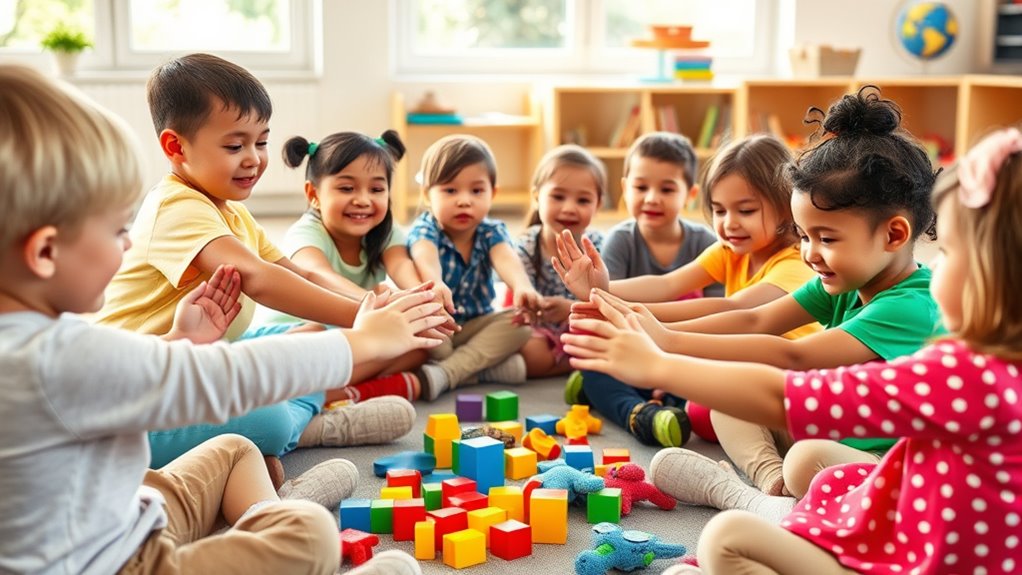Sharing and turn-taking are essential for developing strong social skills through play. When you encourage your child to share toys and wait for their turn, they learn patience, fairness, and self-control. These actions help them understand others’ feelings and resolve conflicts peacefully. By practicing these skills, your child builds empathy and emotional intelligence that lasts a lifetime. Keep exploring to discover how you can support their growth in meaningful ways.
Key Takeaways
- Play-based sharing and turn-taking teach patience, fairness, and cooperation, fostering essential social skills in children.
- Facilitated play helps children express feelings, negotiate, and resolve conflicts peacefully, building emotional understanding.
- Practicing sharing during play develops self-control, empathy, and effective communication for positive social interactions.
- Active facilitation reinforces that sharing and turn-taking are valuable for building confidence and healthy relationships.
- Long-term, these skills promote respectful conflict resolution and social competence into adulthood.

Have you ever wondered why sharing and turn-taking are essential skills for kids? These social skills form the foundation for healthy relationships, effective communication, and emotional understanding. When children learn to share and take turns, they begin to grasp how their actions affect others, which helps develop empathy and emotional intelligence. This understanding is vital because it enables kids to recognize feelings like happiness, frustration, or disappointment in themselves and others. As they navigate these interactions, they also learn about conflict resolution—how to manage disagreements in a peaceful and respectful manner.
By encouraging sharing and turn-taking, you’re helping your child understand that patience and fairness are valuable qualities. For example, when children wait for their turn on a game or share toys without fuss, they practice self-control and develop a sense of fairness. These moments teach them that cooperation often leads to more positive experiences than selfishness or impulsiveness. Plus, they’ll learn how to handle situations when they don’t get what they want immediately, which fosters resilience and emotional regulation. Over time, these skills become internalized, making it easier for kids to approach conflicts with a calm and understanding attitude.
Engaging in play that involves sharing and turn-taking provides real-life opportunities to practice conflict resolution. For instance, if two children want the same toy, they might argue initially, but through guided support, they learn to express their feelings and negotiate a solution. This process promotes emotional understanding because kids begin to see things from others’ perspectives. They realize that others have feelings and needs, just like them. As they practice resolving conflicts during play, they develop patience and learn effective ways to communicate their desires without aggression or resentment.
Furthermore, when you actively facilitate these exchanges, you’re helping your child build confidence in their social abilities. They start to see that sharing and turn-taking are not just rules but ways to connect with others positively. They learn that conflicts are natural, but they can be addressed through understanding, compromise, and respect. These lessons extend beyond playtime, shaping how they handle disagreements in school, with friends, and later in adult relationships. In this way, fostering sharing and turn-taking isn’t just about managing toys; it’s about nurturing emotional understanding and conflict resolution skills that will serve your child for a lifetime.
Frequently Asked Questions
How Can Parents Encourage Sharing in Children Who Are Naturally Possessive?
You can encourage sharing in possessive children by practicing possessiveness management through gentle, consistent guidance. Praise their efforts when they attempt sharing, emphasizing positive behavior. Use playful activities to model sharing and turn-taking, making it fun and engaging. Offer small incentives or reassurance to reduce possessiveness, and set clear, age-appropriate expectations. Over time, this approach helps your child understand sharing as a positive social skill.
What Are Effective Strategies for Teaching Turn-Taking to Very Shy Kids?
Imagine you’re in a silent movie, and your shy child is the star. To teach turn-taking, you model the behavior by taking turns yourself and using visual cues like timers or hand signals to signal when it’s their turn. Keep interactions short, positive, and consistent. Over time, your child will learn to feel comfortable participating, building confidence while understanding the importance of sharing space and attention.
How Does Early Social Play Influence Long-Term Peer Relationships?
Early social play critically influences your child’s long-term peer relationships by fostering essential social skills and confidence. When kids engage in social play, they develop vital early social development, learning how to share, take turns, and communicate effectively. These interactions strengthen peer connections, helping them build trust and empathy. Over time, this foundation encourages healthier, more positive peer relationships, making social interactions smoother and more enjoyable throughout their childhood and beyond.
Are There Specific Toys or Games That Promote Sharing Skills?
You can promote sharing skills with partner games and cooperative toys that require teamwork. These toys encourage your child to take turns, communicate, and work together toward a common goal. Look for puzzles, building sets, or board games designed for multiple players, as they naturally foster sharing and patience. By engaging with these types of toys, your child learns valuable social skills that benefit peer interactions now and in the future.
How Can Teachers Incorporate Sharing and Turn-Taking Into Classroom Activities?
You can weave sharing and turn-taking into your classroom by organizing engaging group activities and role-playing scenarios. Encourage students to take turns and share materials, gently guiding them when needed. Create a supportive environment where children feel comfortable practicing these skills, and praise their efforts. Incorporate games that naturally promote patience and cooperation, helping kids understand the value of sharing while enjoying meaningful social interactions.
Conclusion
Just like the timeless dance of Robin Hood and his merry band, sharing and turn-taking help you build strong social skills. When you encourage these behaviors through play, you’re guiding children to become confident, empathetic, and cooperative. Remember, every game is a chance to teach patience and respect—lessons that echo through their lives like a legendary tale. Embrace play as your tool, and watch social bonds grow stronger, much like stories woven into history.









